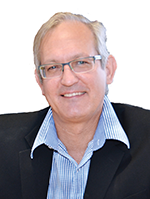

In the past two months, I have written about AI and the effect it has, or can have, on our daily lives, both personally and professionally. Whether you are an engineer, technologist or technician, registration with ECSA is not merely a formality, it is a professional milestone that affirms your competence, enhances your credibility and aligns you with both national and international standards of excellence.
The legal imperative
The Engineering Profession Act 46 of 2000 established ECSA as the statutory body responsible for regulating the engineering profession in South Africa. This Act mandates the registration of professionals, candidates and specified categories, and empowers ECSA to ensure that engineering work is performed only by those who are appropriately qualified and registered.
In recent years, the South African government has published various regulations under this Act, including the Identification of Engineering Work (IDoEW) regulations. These rules define the scope of engineering work that may only be performed by registered persons. In essence, if you are practicing engineering in any capacity that affects public or worker safety, infrastructure or industrial operations, registration is not optional, it is a legal requirement.
Categories of registration
ECSA offers registration in several professional categories, each tailored to different levels of qualification and experience:
• Professional Engineer (Pr Eng).
• Professional Engineering Technologist (Pr Tech Eng).
• Professional Engineering Technician (Pr Techni Eng).
Each category requires a structured period of practical experience, submission of detailed engineering reports and a professional review interview to assess competence against internationally benchmarked standards.
Recognition of new disciplines
In response to the evolving demands of industry and technology, ECSA has recently recognised two new engineering disciplines:
• Mechatronics Engineering: This interdisciplinary field integrates mechanical engineering, electrical engineering, computer science and control systems. It focuses on smart systems, factory automation and process automation, areas that were previously grouped under electrical engineering, but have now been acknowledged as distinct due to their specialised nature.
• Computer Engineering: This discipline merges electrical engineering and computer science to design and develop hardware and software systems, including those used in manufacturing operations management (MOM) and manufacturing enterprise solutions (MES). ECSA recognised that automation, enterprise integration and artificial intelligence tools require unique competencies, prompting the formal establishment of Computer Engineering as a separate discipline.
These changes reflect ECSA’s commitment to keeping pace with technological advancement and ensuring that professionals working in these emerging fields are properly recognised and regulated.
The implication of the new engineering disciplines
Historically, people doing engineering work in the computer or software environment completely ignored ECSA, as the closest discipline was Electrical, and the view often aired was “I work with computers and write software, I do not work with electricity.” By recognising the two new disciplines, ECSA has effectively removed that excuse. So, if you are doing engineering work at engineer, technologist or technician level, you are legally obliged to register with ECSA. If you are unsure whether or not you are in fact doing engineering work, please review the Identification of Engineering Work (IDoEW) regulation to get your answer.
Why registration matters
The benefits of ECSA registration are both individual and collective, and they extend far beyond the certificate on your wall. They include:
• Professional recognition
• Public trust and accountability
• Legal compliance
• Career advancement
• International recognition
• Access to voluntary associations and continuous professional development
A strategic opportunity
The SAIMC, as a voluntary organisation committed to the advancement of automation and computer engineering in South Africa, urges all our members and readers of this publication to take the next step in their professional journey. Whether you are a recent graduate or a seasoned practitioner, ECSA registration is a strategic investment in your future. The process is transparent and well supported. ECSA provides detailed guidelines, online portals and mentorship resources to assist applicants.
Our role as a community
We recognise that registration can be a daunting process, especially for those who have been practicing for years without formal recognition. That is why our organisation is committed to supporting our members through:
• Information sessions and workshops
• Mentorship programs
• Peer review support
We also encourage employers, academic institutions and industry leaders to promote registration within their organisations. By doing so, we collectively raise the standard of engineering practice in South Africa and contribute to a safer, more innovative and more accountable built environment.
In closing
Engineering is more than a profession, it is a public trust. As practitioners, we bear the responsibility of designing, building and maintaining the systems that underpin our society. Registration with ECSA is not just a regulatory requirement; it is a declaration of our commitment to excellence, ethics and lifelong learning.
If you want to know more about professional registration, attend the SAIMC End User Conference on 15 and 16 October 2025 at the Fairway Hotel in Northcliff, Johannesburg. At the conference, amongst automation case studies, industry and economic thought leaders and guest speakers, we have Mildred Mtshali from ECSA and Johan Maartens from the SAIMC, who will enlighten us about the identification of engineering work and the enforcement rules. We hope to see you there.
| Tel: | +27 11 312 2445 |
| Email: | [email protected] |
| www: | www.saimc.co.za |
| Articles: | More information and articles about SAIMC |

© Technews Publishing (Pty) Ltd | All Rights Reserved